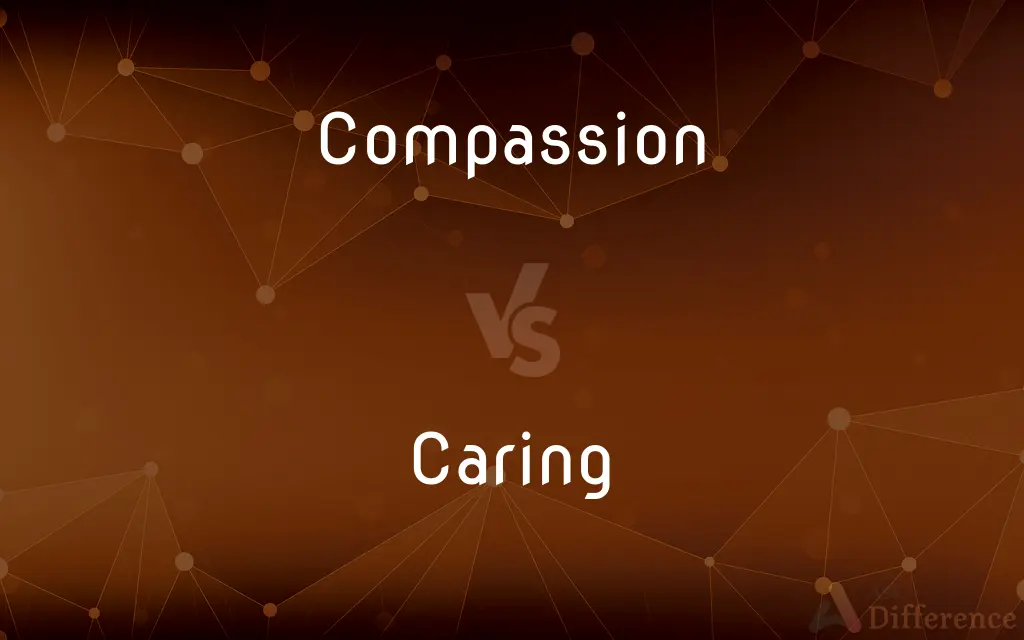Compassion vs. Caring — What's the Difference?
By Fiza Rafique & Maham Liaqat — Updated on March 20, 2024
Compassion is feeling empathy towards others' suffering, while caring involves actively looking after someone's needs.

Difference Between Compassion and Caring
Table of Contents
ADVERTISEMENT
Key Differences
Compassion and caring are two vital human emotions and behaviors that often go hand in hand but serve different aspects of interpersonal relationships and self-awareness. Whereas caring is more action-oriented, involving the activities or behaviors undertaken to assist, support, or look after someone, either emotionally or physically.
While compassion is deeply emotional and somewhat passive, focusing on feeling with and for others, caring translates these feelings into actions. For instance, one can feel compassion for someone experiencing hardship without necessarily taking direct action to help. On the other hand, caring involves taking tangible steps to provide comfort, support, or assistance, reflecting a more hands-on approach to addressing the needs and concerns of others.
Compassion often serves as the emotional foundation that inspires the act of caring. In essence, while one can care without feeling deep compassion (as in duty-bound scenarios or professional roles), true compassion often motivates a deeper, more personal engagement in the caring process. This distinction highlights the complementary nature of these concepts, where compassion can be seen as the driving force behind the act of caring.
Caring, due to its action-oriented nature, is more easily observed and measured in the physical realm through specific acts such as providing for someone's needs, offering emotional support, or performing tasks to ease another's burdens. Compassion, however, is more abstract, residing in the realm of feelings and attitudes, making it somewhat more subjective and internally experienced.
Both compassion and caring are essential for healthy relationships and communities, contributing to the overall sense of belonging, understanding, and support within societal structures. They are fundamental to the human experience, fostering connections, and nurturing the social fabric that binds individuals together.
ADVERTISEMENT
Comparison Chart
Nature
Emotional, empathetic
Action-oriented, practical
Focus
Understanding and sharing feelings
Providing support and assistance
Basis
Empathy towards others' suffering
Responsibility for others' well-being
Manifestation
Internally, through feelings
Externally, through actions
Relationship
Can exist without direct action
Implies direct action and involvement
Compare with Definitions
Compassion
A foundational aspect of emotional intelligence, involving empathy and concern for others.
Compassion in leadership fosters trust and loyalty.
Caring
Providing what is necessary for the health, welfare, maintenance, and protection of someone or something.
Caring for your mental health is as important as physical health.
Compassion
The ability to understand and share the feelings of another.
Her compassion for the homeless moved her to volunteer at the shelter.
Caring
The act or process of looking after someone, especially those unable to care for themselves.
Caring for an elderly parent can be both rewarding and challenging.
Compassion
An innate or cultivated ability to recognize the emotional state of others without judgment.
Compassion is a trait that makes him a good friend.
Caring
Actions that express consideration and provide comfort to someone.
Simple acts of caring can brighten someone's day.
Compassion
Feeling deep sympathy and sorrow for someone struck by misfortune, accompanied by a strong desire to alleviate the suffering.
The nurse's compassion for her patients was evident in her gentle manner.
Caring
Involving or displaying effort and attention to detail.
He has a very caring approach towards his work.
Compassion
A virtue in various philosophical and religious traditions, emphasizing the interconnectedness of all beings.
Compassion towards all living beings is a central tenet of Buddhism.
Caring
Displaying kindness and concern for others.
Her caring nature makes her a great teacher.
Compassion
Compassion motivates people to go out of their way to help the physical, mental, or emotional pains of another and themselves. Compassion is often regarded as having sensitivity, which is an emotional aspect to suffering.
Caring
Displaying kindness and concern for others
A caring and invaluable friend
Compassion
Sympathetic pity and concern for the sufferings or misfortunes of others
The victims should be treated with compassion
Caring
The work or practice of looking after those unable to care for themselves, especially on account of age or illness
The caring professions
Compassion
Deep awareness of the suffering of another accompanied by the wish to relieve it.
Caring
Feeling and exhibiting concern and empathy for others.
Compassion
Deep awareness of the suffering of another, coupled with the wish to relieve it.
Caring
(of a person) Kind, sensitive, or empathetic.
She's a very caring person; she always has a kind word for everyone.
Compassion
(obsolete) To pity.
Caring
Present participle of care
Compassion
Literally, suffering with another; a sensation of sorrow excited by the distress or misfortunes of another; pity; commiseration.
Womanly ingenuity set to work by womanly compassion.
Caring
The act of one who cares.
Compassion
To pity.
Caring
A loving feeling
Compassion
A deep awareness of and sympathy for another's suffering
Caring
Showing a care;
A caring mother
Compassion
The humane quality of understanding the suffering of others and wanting to do something about it
Caring
Having or displaying warmth or affection;
Affectionate children
Caring parents
A fond embrace
Fond of his nephew
A tender glance
A warm embrace
Caring
Feeling and exhibiting concern and empathy for others;
Caring friends
Common Curiosities
What is compassion?
Compassion is the emotional response of empathy and sympathy towards the suffering of others, often accompanied by a desire to help.
What does it mean to be caring?
Being caring means providing support, assistance, or care to someone, showing kindness and concern for their well-being.
How do compassion and caring differ?
Compassion is an empathetic understanding of another's suffering, while caring involves taking actions to support or help someone.
Is caring always motivated by compassion?
Not always; caring can be motivated by duty, responsibility, or professional roles, even without deep emotional engagement.
Why is compassion important in society?
Compassion fosters empathy and understanding, essential for cooperation, helping those in need, and building a more connected society.
What are the signs of a caring person?
A caring person shows kindness, takes initiative to help, listens attentively, and makes efforts to understand and support others.
Can animals show compassion and caring?
Yes, many animals display behaviors that suggest forms of compassion and caring, especially towards their offspring or group members.
Can you have compassion without caring?
Yes, one can feel compassionate (empathy for someone's situation) without taking caring actions, especially in situations where direct help isn't possible.
What role does caring play in healthcare?
In healthcare, caring is crucial for patient recovery and comfort, emphasizing empathy and personal attention in treatment.
How do compassion and caring contribute to relationships?
They foster emotional connections, understanding, and support, strengthening bonds between individuals.
How do compassion and caring impact personal relationships?
They enhance trust, deepen emotional connections, and create a supportive environment, vital for healthy and lasting relationships.
Can you learn to be more compassionate or caring?
Yes, both qualities can be developed through mindfulness, empathy exercises, and actively practicing kindness and support.
How can compassion affect mental health?
Practicing compassion can improve one's emotional well-being, reduce stress, and increase a sense of connectedness.
How can I show compassion in everyday life?
Listening, acknowledging others' feelings, offering support, and practicing kindness are simple ways to show compassion.
What makes caring actions effective?
Caring actions are most effective when they're attentive, meet the actual needs of the individual, and are done with genuine concern.
Share Your Discovery

Previous Comparison
Strength vs. Might
Next Comparison
Tortilla vs. LavashAuthor Spotlight
Written by
Fiza RafiqueFiza Rafique is a skilled content writer at AskDifference.com, where she meticulously refines and enhances written pieces. Drawing from her vast editorial expertise, Fiza ensures clarity, accuracy, and precision in every article. Passionate about language, she continually seeks to elevate the quality of content for readers worldwide.
Co-written by
Maham Liaqat













































